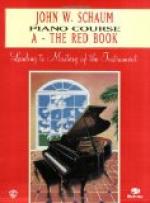Mr. Matthay as minutely gives directions as to the muscular problems of touch and technique. For instance, he explains how all varieties of tone, good and bad, are caused, all inflections of Duration, and the laws which govern the attainment of Agility and ease of Technique; and also explains the nature of incorrect muscular actions which prevent the attainment of all these things. He shows where the released arm weight should be applied, and again, where it should be eliminated; makes clear the two opposite forms of technic implied by “flat” and “bent” finger actions, and he goes exhaustively into the little-understood question of forearm rotary exertions, the correct application of which he proves to be necessary for every note we play.
In speaking of methods in piano teaching, Mr. Matthay said to me:
“I can say I have no method of playing, and moreover I have not much faith in people who have. My teachings merely show how all playing, good or bad, is accomplished. There are certain principles, however, which every player should know, but which, I am sorry to say, are as yet scarcely apprehended even by the best teachers. The great pianists have experimented till they have hit upon effects which they can repeat if all conditions are favorable, and they are in the mood. As a rule they do not know the laws underlying these effects. You may ask the greatest pianists, for example, how to play octaves. ’Oh, I play them thus’—illustrating. Just what to do to attain this result they cannot explain. In my own case I have done much experimenting, but always with the view to discovering how things are done—the facts and laws governing actual tone production and interpretation. I made a study of Rubinstein’s playing, for I found he played a great deal better than I did. So I discovered many things in listening to him, which he perhaps could not have explained to me. These facts are incontrovertible and I have brought many of my colleagues to see the truth of them. More than this, I have brought many even of my older colleagues who had a life-time of wrong mental habits to impede them, to realize the truth of my teachings.
“The work of a teacher should speak for itself. For my own part I never advertise, for I can point to hundreds of pupils—this is no exaggeration in the least!—who are constantly before the public, as concert pianists and successful teachers.
“If there is one thing that rouses me deeply, it is the incompetence of so many teachers of piano. They say to the pupil: ’You play badly, you must play better’; but they do not tell the pupil how to play better. They give doses of etudes, sonatas and pieces, yet never get at the heart of the matter at all. It is even worse than the fake singing teachers; I feel like saying it is damnable!”
It was my privilege to be present at some of Mr. Matthay’s private lessons, given at the Royal Academy. Several young men were to try for one of the medals, and were playing the same piece, one of the Strauss-Tausig Valse Caprices.




